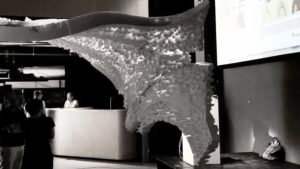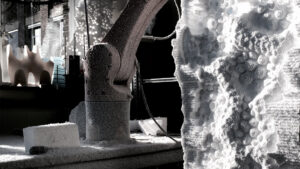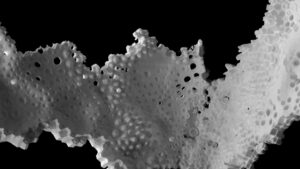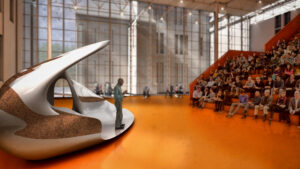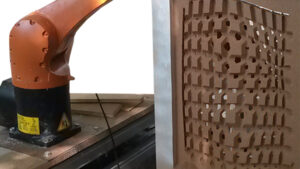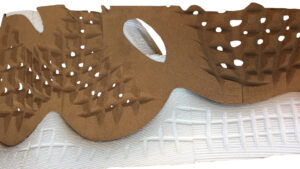Building are hierarchical systems that interact with the environment and preserve stable states leading to highly diverse and fluctuating functional and performance requirements. This heterogeneity suggests the need for design and automated fabrication of hybrid multi-material systems where different subsystems perform complementary functions and have coordinated behaviors.
Multimode Hybridity features modular structures with an assembly logic based on the transmission of loads inside a structural system. The project showcases an automated customizable fabrication process. The programmability and customizability of industrial robot arms is leveraged in subtractive milling processes, establishing feedback loops between design and fabrication and vice-versa.
Discrete components are volumetrically cut in EPS and then milled. The component’s fabrication data is shared between the robotic workstations. Added efficiency achieved by volumetric cutting is coupled with added design detail by milling.
The pieces’ assembly logic lies at the basis of the robotic fabrication application. The resulting segmented shell features variable thicknesses, related to variable performance across its topology.
As in masonry vaults, the “keystone” component manages the transition between different curvature directions, a saddle point for a rough double-curvature shell. This research shows first evidence that multi-materiality achieved through multimode robotic fabrication may lead to more easily reachable mass customization in the building industry.
Project Team
Prof. Kas Oosterhuis, Director Hyperbody TUDelft,
Dr. Ing. Henriette Bier, Dr. Ing. Nimish Biloria, Phd. Cand. Arch. Sina Mostafavi, Arch. MSc. Ana Anton, Arch. MSc. Serban Bodea
